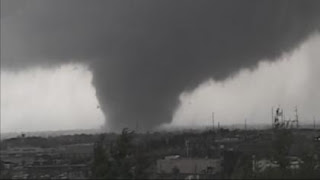Originally published at Am I the Only One Dancing?. Please leave any comments there.
 |
| (the tornado that devastated Tuskaloosa in 2011) |
A tornado, a hurricane, an earthquake, a tsunami or a blizzard has just struck. People are dead or missing, and property has been destroyed. You want to help (of course you do!), and for once you have the time available to volunteer – but you don’t know where to start what is needed. What should you do? And what shouldn’t you do?
Things to Do:
-
Call a reputable local, national or international charity with experience in responding to disasters and offer help
-
Be patient - in the immediate aftermath of a disaster, these places are busy. Even experienced disaster agencies often have difficulty getting all of the pieces of the response together. Bring something to entertain yourself during inevitable waiting and down-times.
-
Get educated. Attend classes the agency requires you to attend, or read up on conditions and procedures. If you want to volunteer for disaster services but there is not an immediate need, go ahead and get your training now.
-
Get booster shots and a check up — the aftermath of a disaster is a prime location for disease and injury.
-
Pack according to conditions. The agency you work with will probably have some advice. A rule of thumb is to pack light with only things you will need – and to bring with you any small items you may not be able to obtain at the disaster site. This may include medications, sunscreen, warm clothing layers, razors, and similar items. A good rule of thumb is to pack no more than you can comfortably carry.
-
Clear up all loose ends at home before heading out. Make sure someone ‘has your back’ with any responsibilities you need to delegate. Make a list and check off items.
-
It is very possible you will be living in a dormitory style setting while helping. Pack sleeping clothes accordingly, as well as any sleep comfort items you may need.
-
The conditions at disaster sites can be very stressful. Be sure you understand what you’re getting into. Listen to the experts for the disaster agency as they fill you in, and prepare yourself emotionally.
-
If you have strong doubts as to whether you’ll be able to ‘keep it together’ in the face of grief and anger and frustration on the part of disaster survivors, talk about your doubts with someone you trust and decide if you should really need to be on the front lines of this particular disaster.
-
Follow all instructions of law enforcement, firefighters, disaster agencies (non-profit and governmental) and other officials. Disasters are chaotic situations. You are there to help, not get in the way. Let the leaders lead.
-
Check your ego and your prejudices at home. Unexpected leaders often arise in volunteer situations. This is not about you, it’s about the survivors of the disaster.
-
Expect unhappy survivors to sometimes take it out on you. You’re there, they’re human, and you represent help that may not be perceived as ‘helpful enough’
-
Rest whenever you have an opportunity. Self care is vitally important in disaster workers. If you don’t take care of yourself, you won’t have anything to offer others.
-
Keep safety in mind at all times. Yours, survivors, and others.
Don’t do these things:
-
Jump in your car or on a plane and ‘just show up’. You are far more likely to be in the way and make more work for someone than you are to be helpful.
-
Bring a ton of ‘stuff’ to give to pass out to survivors. Other pieces of the disaster response will handle that. You will have difficulty carrying it and storing it in the typical disaster situation, and your gesture may interfere with coordinated efforts.
-
Be a pain in the neck. You are going to be working and living in what may be very stressful, unpleasant conditions. Whining, complaining, and demanding that others deal with you is not helpful.
-
Go wandering around the wreckage without approval. Disaster wreckage is dangerous, and authorities have enough tasks on their plates without dealing with volunteers who decide to go sight-seeing and injure themselves or cause other problems.
-
Demand gratitude from those you help. You may have survivors express gratitude, but for many people the anger and fear and grief make it impossible. Expect anger and grief.
-
Go outside the established parameters to help. For your own safety, the well-being of those you’re helping, and the liability of the organization you’re with, stick with the program. The program is there for a reason.
-
Beat yourself up over mistakes. You’re going to make them. Go easy on yourself.
-
Think you’re indispensable. You’re not. There were helpers before you got there, and there will be others after you leave.
Places to go for more information:
your local church or disaster agency
To find more ways to help, return to Just Helping People
![]() Subscribe and never miss an update!
Subscribe and never miss an update!
If you liked this advice, please like us on Facebook and help us get the word out, or follow us on Twitter at @justhelpu